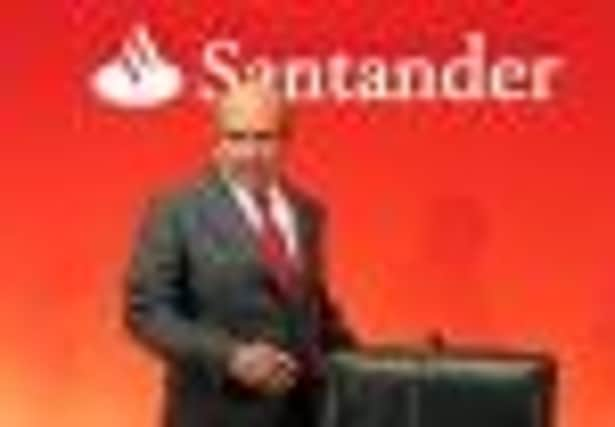Santander launches account offering cashback on bills


The 123 account pays cashback of up to 3 per cent on some household bill payments and hits the market at a time when household finances are under growing pressure.
However, its arrival spells the end of the bank’s £100 switching offer and also means its Preferred Current Account, which pays interest of 5 per cent, is no longer available to new customers.
Advertisement
Hide AdAdvertisement
Hide AdThe 123 product also comes with a £2 monthly fee that experts warn could wipe out many of the benefits for some customers.
The account, which requires a minimum monthly deposit of £500, pays 1 per cent cashback on individual water and council tax direct debits, 2 per cent on fuel payments and 3 per cent on mobile, landline, broadband and bundled TV packages.
Customers need at least two direct debit bill payments to qualify.
Hitting the shelves on Monday, it is available to those able to pay in £500 a month, though interest on the money in account is limited to 1 per cent for those with balances below £2,000.
The interest paid ranges from 1 per cent on the entire balance once it is £1,000 or over to 3 per cent when it is £3,000 or over.
The account will run alongside the bank’s 123 cashback credit card, which pays cashback at supermarkets, department stores and petrol stations.
Rami Aboukhair, director of products and marketing at Santander, said: “We understand that times are tough at the moment, and we believe our new 123 Current Account will help make a real difference to people by providing interest on balances and cashback on their everyday bills.”
Michael Ossei, personal finance expert at uSwitch.com,said: “Getting cashback for paying your essential bills sounds like a no-brainer and many cash-strapped consumers will jump at the chance of getting “money for nothing”.
Advertisement
Hide AdAdvertisement
Hide AdBut there’s a catch, in the form of a £2 monthly fee that for some users could significantly erode the value of the cashback.
“While those with high essential household bills could really benefit from this new account, the average consumer is likely to make almost £72 a year from the cashback scheme,” said Ossei. “And once the £2 monthly fee is taken into account, this reduces the value of the cashback to just under £48 a year, or just £4 a month. Other accounts, such as the Halifax/Bank of Scotland Reward account, which offers a flat £5 a month instead of interest, could potentially give better value.”
Andrew Hagger, head of communications at Moneynet, pointed out that while the £2 monthly fee can easily be recouped through the cashback, the bank also has the option to increase it over time.
“Even if it were to raise the fee from £2 to £3 at a later date, it would vastly increase its revenue stream without causing a mass exodus of customers.”
The withdrawal of the preferred account and its 5 per cent in-credit interest is a blow to those wanting their cash to work harder, however.
“In its place is a tiered interest rate with the highest rate of 3 per cent only for balances of over £3,000. Those with a balance of less than £1,000 will not earn any interest at all,” said Ossei.